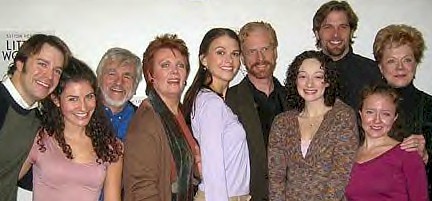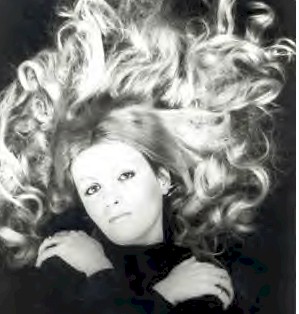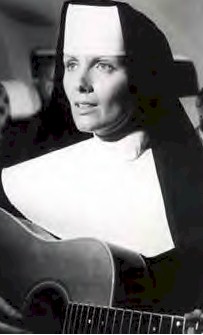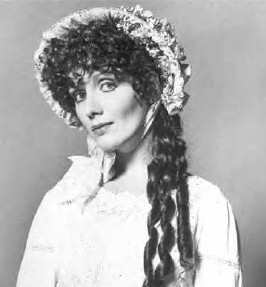]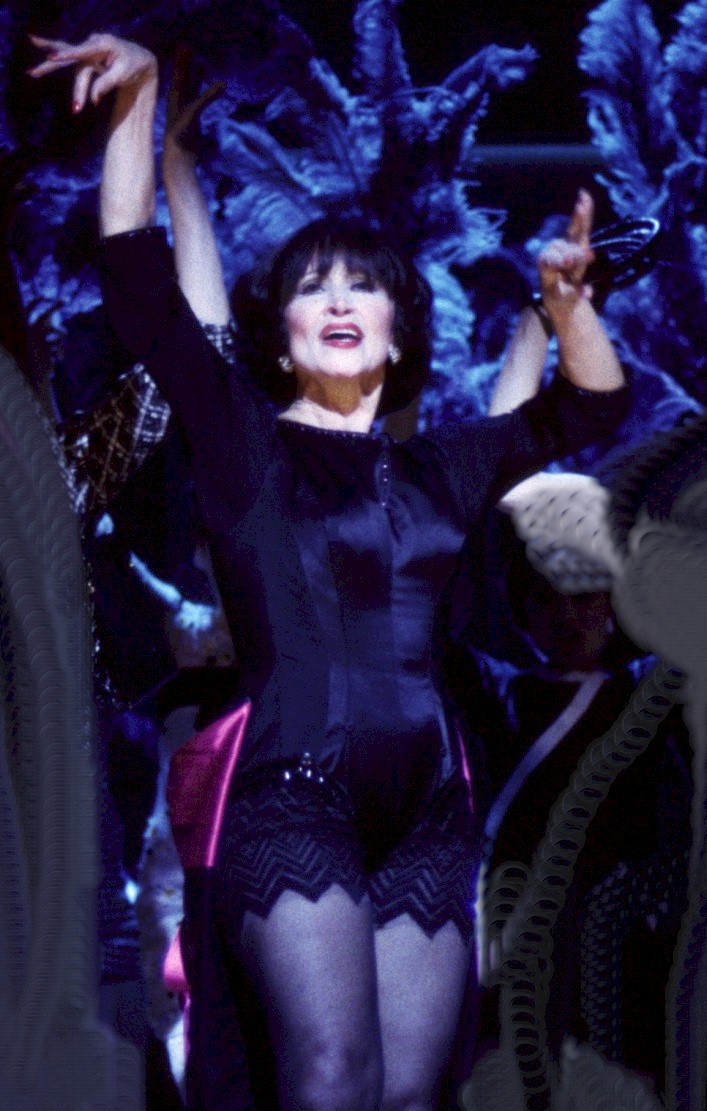
CHITA RIVERA, at the Follies, in Roundabout's Nine revival.
[Photo: Joan Marcus]
Long after many other performers of a certain age have disappeared from the scene, Broadway's former Queen of the Gypsies, Chita Rivera, a.k.a. Dolores Conchita Figueroa del Rivero, like the Battery Bunny is still going, going, going. In fact, she's showing no signs of stopping. In spite of some heavy duty obstacles placed in her path, in late May the indefatigable Rivera will celebrate 50 years in show business.
One of the events leading up to this milestone in a momentous career begins Tuesday [through March 12] when Rivera salutes Jerry Herman, Cy Coleman, Jacques Brel, Carol Hall, Jule Styne and, of course, Kander & Ebb, with whom she's had a long association, in her new revue And Now I Sing, which marks her debut at New York's Feinstein's at the Regency [540 Park Avenue at 61st Street, in the Regency Hotel].
Rivera is being very tight-lipped about what songs from these Broadway composers she'll actually do "because I really want this show to be a surprise." But one thing she says for certain is "I won't dance." But Chita on a stage and not moving? No way. Expect the rhythm to flow through that agile body of hers. Other things you can count on: a fun duet with music director Mark Hummel, Chita's longtime accompanist and arranger [Trivia: they met on Bring Back Birdie and have been the best of friends since]; one of Kander and Ebb's ballad gems from The Visit; and tributes to Freb Ebb and Cy Coleman.
After her Feinstein engagement, Broadway's treasure will now become a national treasure. Another event is the tour of her one-woman show Dances Through Life, with book by Terrence McNally, directed and choreographed by Graciela Daniele, which will premiere at Denver's Center for the Performing for two weeks beginning June 7-19, 2005.
Is there anything the sensational Rivera hasn't done? Nope. Through her colorful career as a triple-threat [dancer/singer/actress] she's had star billing on Broadway, London, Toronto and Vegas. And, among her eight nominations, taken home two Tony Awards as Best Leading Actress in a Musical [Kiss of the Spider Woman, The Rink].
Not bad for the daughter of Puerto Rican Pedro Julio Figueroa, who played saxophone and clarinet in the Washington-based U.S. Navy Band. He died when Chita was only seven and her mother Katherine Anderson del Rivero not long after auditioning at age 11 in Washington was forced to go to work as a secretary [at the Pentagon].
THERE'S NOTHING LIKE THIS DAME:
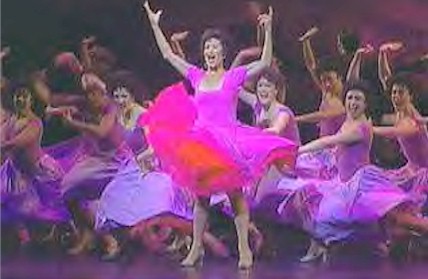 CHITA RIVERA recreating her role as Anita from West Side Story
at the 2002 Broadway Cares/Equity Fights AIDS benefit.
CHITA RIVERA recreating her role as Anita from West Side Story
at the 2002 Broadway Cares/Equity Fights AIDS benefit.
"Some early advice from one of my Washington dance instructors was ëBe who you are!'" says Rivera. From that day forward, she has been.
At ABT, her teachers included Maria Tallchief and Edward Villella. It was the dance world's loss and show biz's gain when the 17-year-old Rivera accompanied a friend to the auditions for the tour of Call Me Madam and she ended up landing the part.
In the mid-50s, she made her Broadway debut in Cole Porter's Can-Can, followed quickly by the Victor Young/Stella Unger musical adaptation of Seventh Heaven. She began her rise out of the chorus in 1957 with Mr. Wonderful, starring Sammy Davis Jr. and as Eartha Kitt's understudy in Shinbone Alley.
Jerome Robbins cast her as Anita in West Side Story [1957] opposite Larry Kert and Carol Lawrence. Her electric performance to his groundbreaking choreography started her on the road to stardom.
It also led to a serious romance with Tony Mordente, who played Jet gang member. They were married during the run. Rivera's critical acclaim equaled that of stars Kert and Lawrence, so much so that producer Hal Prince delayed the WSS West End opening until Rivera gave birth to her daughter and was back in shape.
Her first Broadway starring role was as Rosie in Bye Bye Birdie [1960], which co-starred Dick Van Dyke. But it was three years before she was back on Broadway, when choreographer Peter Gennaro hand-picked her to appear opposite Herschel Bernardi and Nancy Dussault in Bajour [1964], where as Anyanka she was featured doing some spectacular dancing alongside "this brilliant kid Michael Bennett," who was just beginning to branch out into choreography.
In 1968, she headed West. By that time Chita was a tried and true New Yorker, and, she says, "Let's face it, L.A. is not New York. It doesn't have New York's pace or energy and I was very much homesick." While out there, however, Rivera did some fancy footwork as Nickie opposite Shirley MacLaine [and John McMartin, her co-star in Chicago's The Visit] in the film version of Cy Coleman and Dorothy Field's Sweet Charity [1969], which she had previously toured in as Charity for a year.
In 1975, as jealous jail-house rival Velma Kelly, Rivera and Gwen Verdon, as the infamous Roxie Hart, created the razzle-dazzle for Bob Fosse and Kander & Ebb's Chicago; and Rivera has a cameo in the Oscar-winning film adaptation. After stumbling through a very short-lived 1981 Birdie sequel ["Donald O'Connor and I tried valiantly to bring him back, but hard as we tried, we couldn't do it!"]. She was back on Broadway as the Queen in Elmer Bernstein/Don Black's 1983 Merlin, which co-starred Nathan Lane and, lackluster though it was, managed a six-month run mainly due to Doug Henning's magic.
In 1984, she received major recognition playing Liza Minelli's free-spirited mom, Anna, in Kander & Ebb's The Rink, which through its trials and tribulations managed six months on Broadway [Jason Alexander was featured]. A year and a half later, she was co-headling with Dorothy Loudon and Leslie Uggams in the Jerry Herman revue Jerry's Girls.
After her ill-fated auto accident, which many predicted would end her career as a dancer, miraculously Rivera stunned Toronto and then Broadway with her awesome footwork in Kander & Ebb's Kiss of the Spider Woman [1993].
At Paper Mill, she starred as Reno Sweeney in Anything Goes. Recent starring roles include Casper: The Musical at Pittsburgh Civic Light Opera; the Chicago premiere of Kander & Ebb's The Visit [book by Terrence McNally] and the 2003 Tony-winning revival of Maury Yeston's Nine starring Antonio Banderas. Prior to that, she took a leap of faith and starred in Lorca's The House of Bernarda Alba at L.A.'s Mark Taper Forum.
In addition to numerous tours, Rivera was often seen on TV variety shows, but rarely in performance. One of those rare appearances was two weeks ago on NBC's hit sitcom Will and Grace's Valentine's Day episode.
Broadway baby celebrating 50 years in the business.

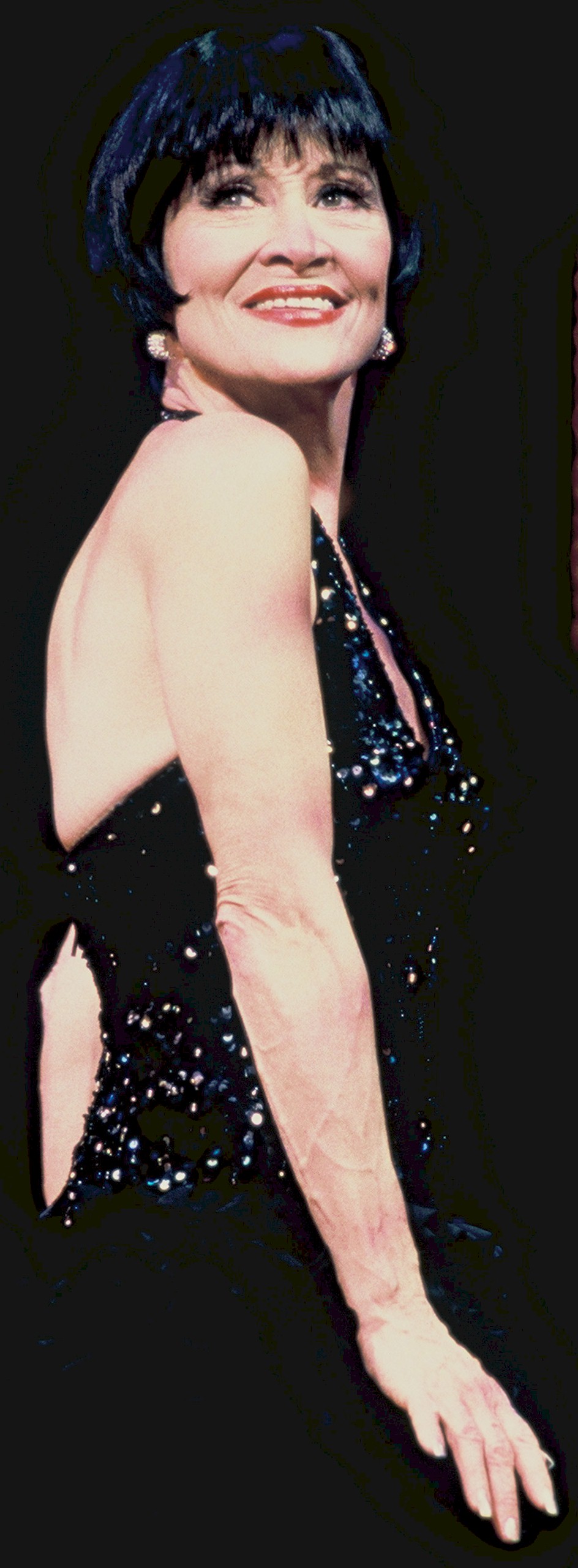
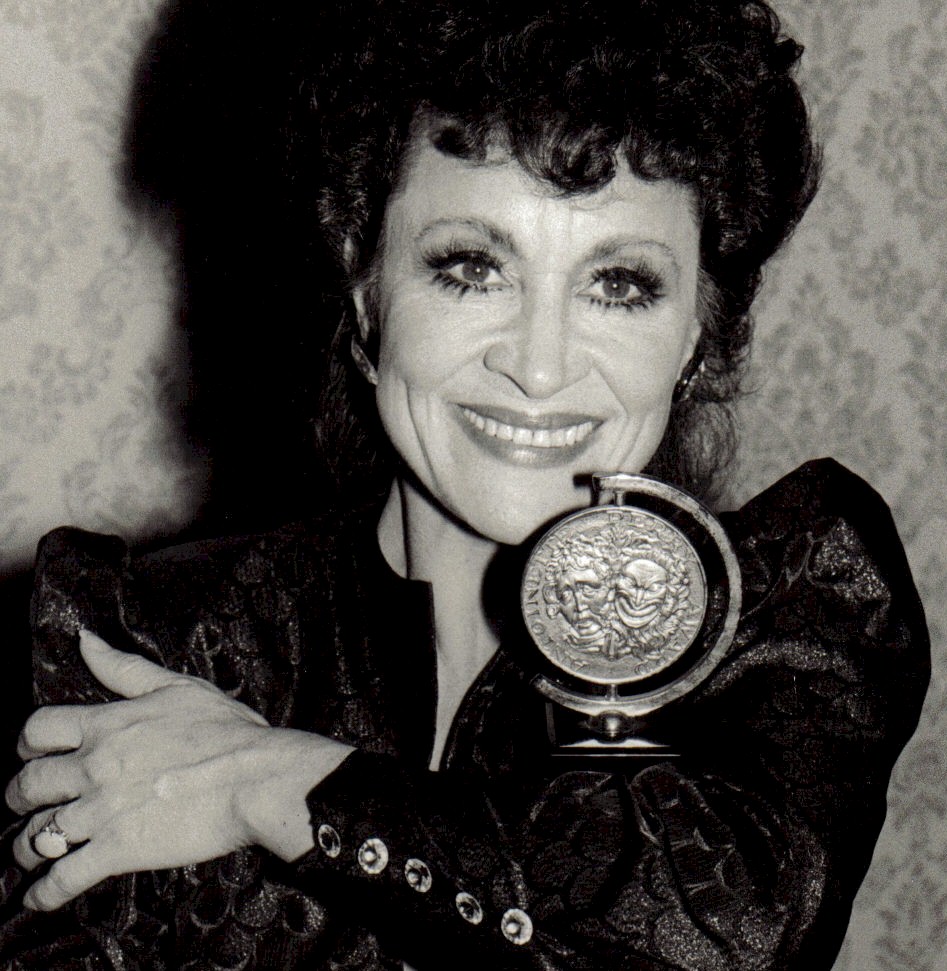
In her 50-year career, Rivera's never been a dreamer. "There's nothing easy about show business," she says. "In fact, it's so seldom that the good guy wins." She, of course, is one of the exceptions.
Looking back, she calls herself "fortunate, a lucky gal" for having had the opportunity to work with George Ballenchine, Jerome Robbins, Bob Fosse [Sweet Charity film], Hal Prince, Arthur Laurents and Frank Galati.
She's quick to note that she is, "first of all, a dancer who's grown into many other things with the great help of the geniuses I've worked with. God's been wonderful. He said, ëOkay, I'll let you go there.' And everyday, I'm still learning."
Dancers, explains Rivera, are an obedient lot. "We do what we're told - generally without opening our mouths. Most directors love that! But, working with these guys, I've always been able - no! been encouraged, to say what I feel."
She also points to her outstanding line-up of "leading men": Van Dyke, Brent Carver and Anthony Crivello [Spider Woman], Donald O'Connor [Bring Back Birdie], McMartin, Banderas "and to work with such giants as Larry Kert [West Side Story], Jerry Orbach [Chicago], Jerry Herman [Jerry's Girls] and Rob Marshall."
Her life in theater, says Rivera, "has been a wonderful and rewarding adventure. With each job, I feel as if I'm being pushed into a new area with these great playwrights and creative teams who trust me and want to direct me and take me further and further down this path of theatrical adventure."
In December 2002, Rivera received a Kennedy Center Honor. More recently, she's been featured in a Smithsonian Institution traveling exhibition, Our Journey/Our Stories: Portraits of Latino Achievement, showcasing the historical and cultural achievements of Hispanics in America.
As obedient as she may be, Rivera also has a sharp thought process. For instance, she explains, "I really wasn't anxious to do Nine. Doing a revival was not at the top of my To Do list. I don't find them challenging. I was working in L.A. and I started hearing tidbits about what it was going to be, who was going to be in it and who'd direct. When my agent called back, I wasn't so negative. I had heard a lot about director David Leveaux. When I heard Antonio was doing it, I thought, 'What an interesting project.'"
But, she laughs, she didn't arrive "all stary-eyed, looking at Antonio as this Hollywood sex symbol." It didn't take long for him to win her over, however. "Soon, I was thinking, 'He's born for the stage.' He was sweet, approachable, charming, savvy and respected everyone. He didn't walk around with star attitude. He sincerely wanted to be accepted as a stage actor on Broadway. And, to prove that, he worked harder than anyone. It was fabulous to see someone respect that space - to really love theater."
The musical adaptation by Kander, Ebb and McNally of The Visit, based on the 1958 play by Friedrich Durrenmatt, at Chicago's Goodman Theatre was, she says, a highlight of her career and she was quite devastated when financing feel through to bring it to Broadway.
The musical was originaly created for Angela Lansbury's return to theater. Early on, however, she withdrew because of her husband's illness. When she was approached, Rivera bravely stepped to the plate. "I had no fear or trepidation going in. I adore Angela. She would have been wonderful, but I made it my part."
As far as any fear about the darkness of the piece, Rivera says, "But I'd been there, done that with John and Fred and came out quite well - Chicago, The Rink, The Kiss of the Spider Woman. I'm happiest being in something that has the audience leaving saying, 'I need a drink. I need to talk about this.' And The Visit was definitely one of those shows."
She says that Kander and Ebb were not fools. "They were like my family, my brothers, so I would have done whatever they asked. It was also my first time working with Ann Reinking. Then, to work with Terrence and Frank, well that was just the topping on the dessert. It was an extraordinary experience. "
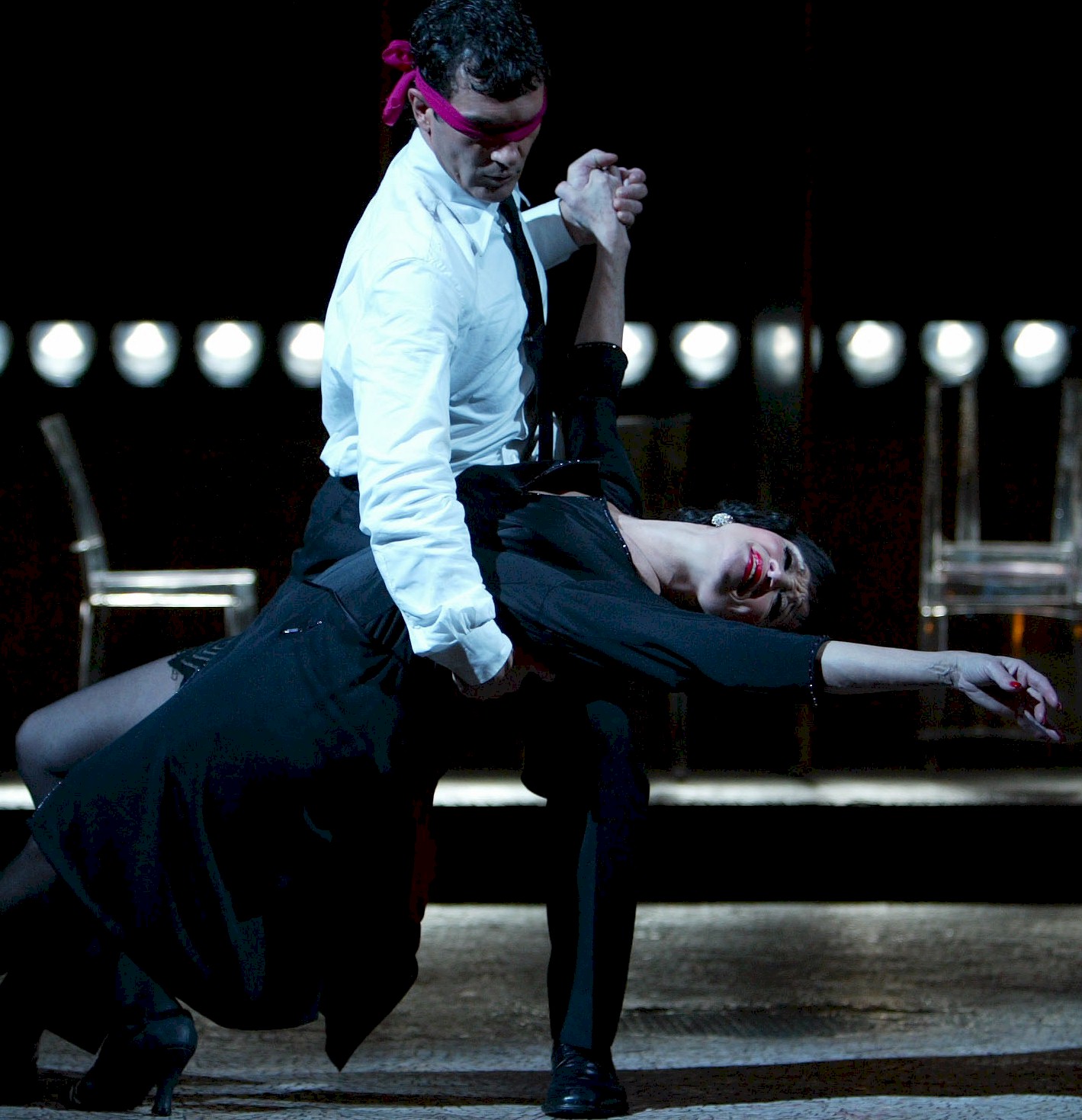
To what does Rivera owe her longevity? Certainly good genes, but most of all to her absolute refusal to think negatively in the face of crisis. Especially her worst crisis.
In a 1986 automobile accident, Rivera's left leg was crushed. That she is able to walk much less dance after her horrendous injuries in an automobile accident, is a miracle. "The prognosis wasn't good," she relates, "but I was determined I'd dance again. When I saw the x-rays, I realized that would be the hardest job of my career." She was thankful for her years as a dancer when discipline, discipline, discipline was instilled in her psyche. "Pity wasn't a word in my vocabulary. I've never been one who does anything half-way."
Amazingly, she was released three weeks later, albeit with 18 screws in her leg. "From day one," Rivera notes, "I obeyed, did exactly what I was told. It was fascinating because I could feel my leg mending." Eleven months later, she had the type of mobility which made her realize she would still have a career. "I wasn't happy with my dancing, but I was on my feet!"
She did a couple of "shakedown" engagements before coming full-circle, career-wise, and signing on for the 1988 international tour of Can Can, with the high-kicking Rockettes. "How crazy is that?" she screams. "Of all the shows! But I didn't miss a kick!"
Rivera says she is happy the accident didn't happen when she was younger, as she may not have been as strong.
As a dancer, Rivera has always maintained that "there is a dance in every movement we make. When you walk onstage, when you move about the scenery, you can make it all appear as dancing. It can all flow. And, when it's not so obvious, that's when you have the real magic."
Not a day goes by, she states, "that I don't pinch myself and say thank you. There's a lot of hard work involved in maintaining a career, but I don't understand it if it isn't hard work. Every once in a while, I think, 'You could be doing something much easier!' But would I be happy? No! My philosophy is: If it works, let's do it. People say, 'Aren't you sorry you didn't do the movie of this, or the movie of that?' No! Because this is the path that's been chosen for me, and I'm going to stay on it as long as I can and as long I should."
Accompaning musical director Mark Hummel for Chita Rivera: And Now I Sing, will be Jim Donica on bass and Michael Croiter on percussion and guitar. Schedule: Tuesday through Saturday, 8:30 P.M.; Friday and Saturday 8:30 & 11:00; $60 cover, with $40 minimum, early shows; $30, late shows. Jackets suggested. For reservations, call (212) 339-4095 or visit TicketWeb.com.
--------
